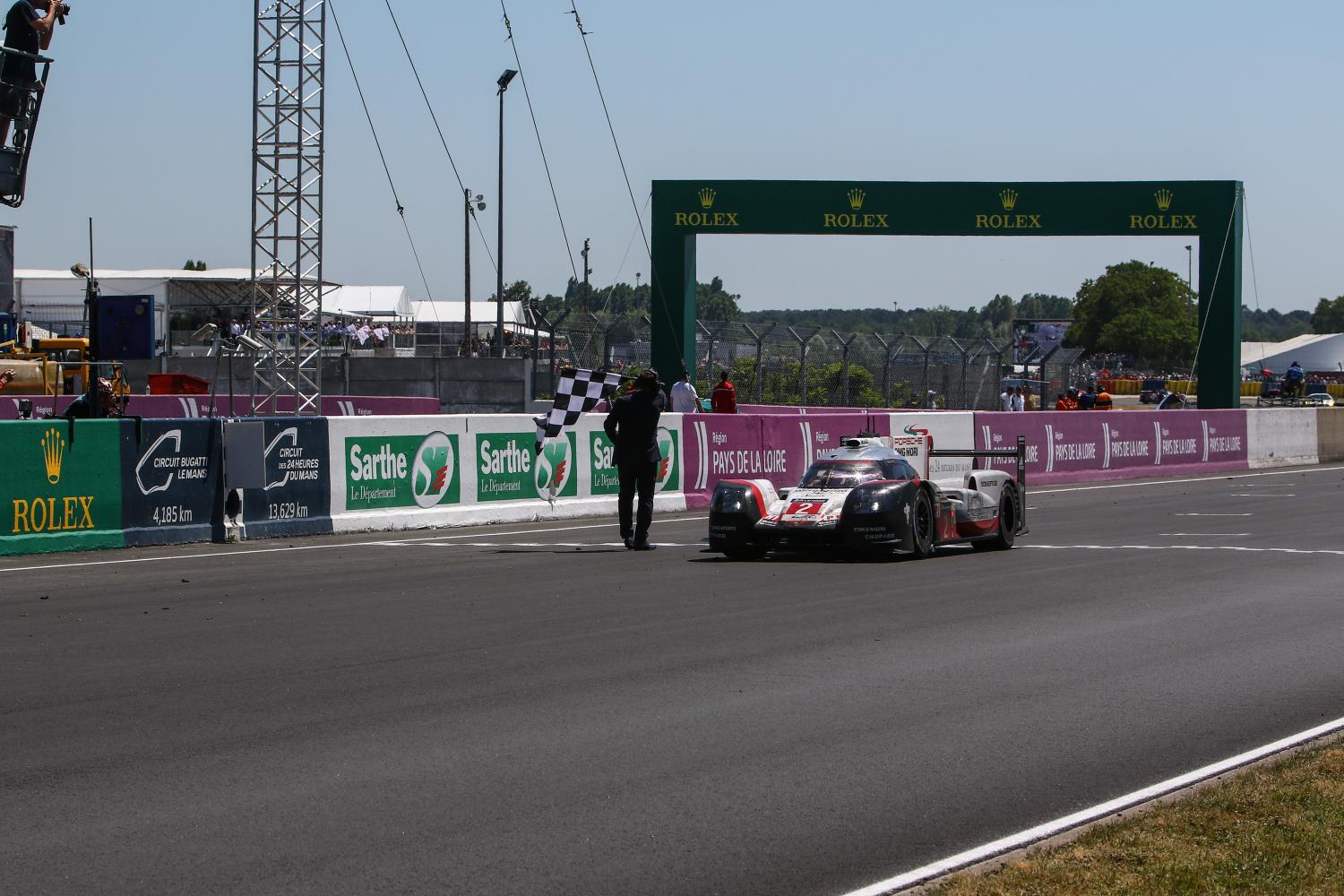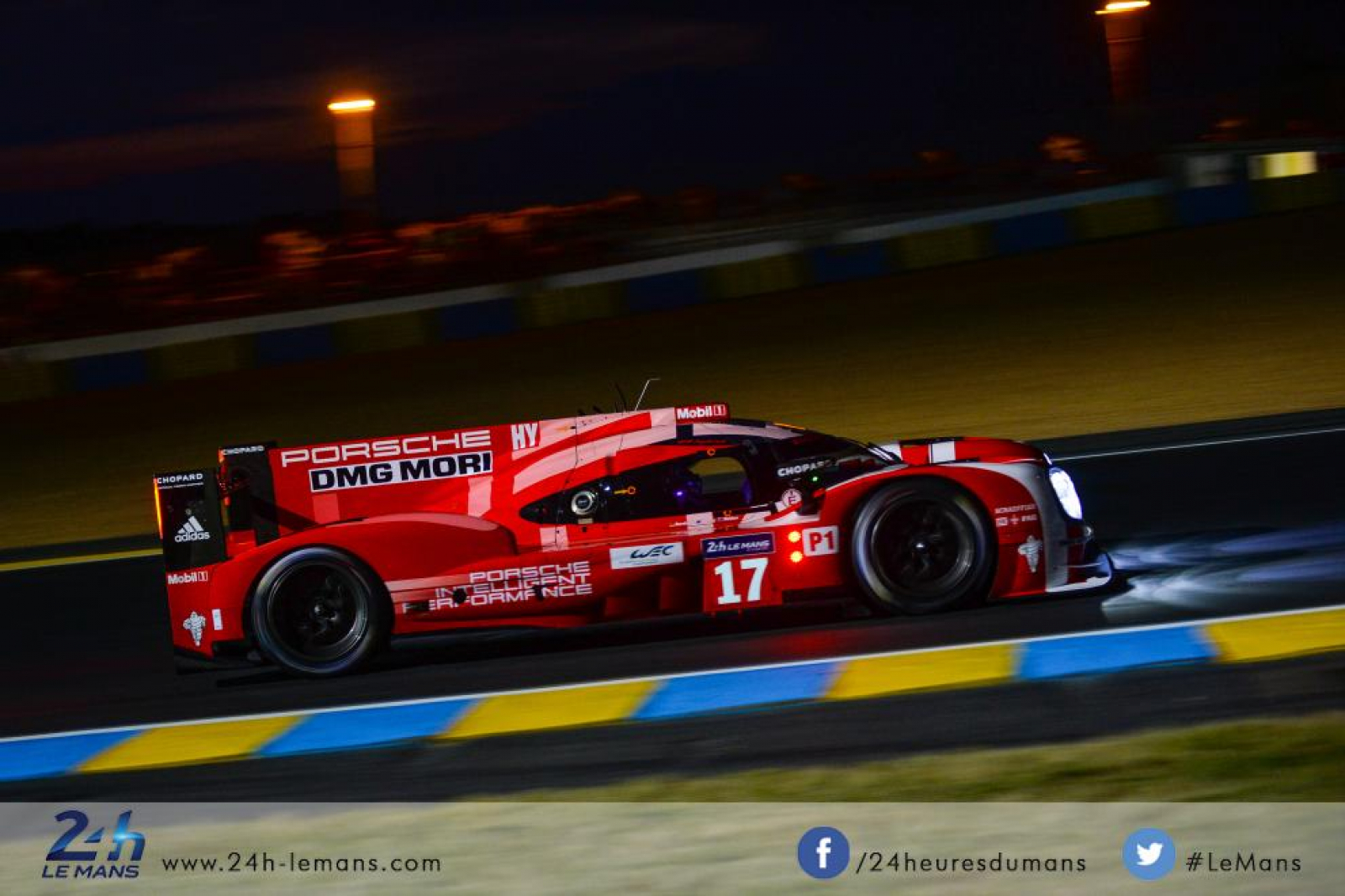24 HOURS CENTENARY – MAKES, MARQUES and IMPRINTS ⎮ After the 917's two wins in 1970 and 1971, Porsche reclaimed the top step on the Le Mans podium in 1976 with the 936. Three additional prototype generations would follow, firmly establishing the German manufacturer's domination at the race.
These four Porsches have earned the marque an extraordinary 19 wins at the 24 Hours of Le Mans, with the 936 and 956 even winning their rookie participations.
936 | Three-time winner for Jacky Ickx
The first version of the 936 was a synthesis of the research Porsche had gathered since its second win in 1971 with the 917. The prototype was powered by a turbocharged engine, first developed in the 917/10 and 917/30 seen in North America in the CanAm Challenge in 1972 and 1973, then in the Carrera RSR that finished second at Le Mans in 1974.
The marque opted for a 2.1-litre turbo engine to power the 936 confirmed to participate in the 1975 24 Hours just three months before the race. Its rear spoiler supported by two large side wings was largely inspired by the 917/30 of 1973. Jacky Ickx drove this car for his three wins in 1976 (with Gijs van Lennep), 1977 (with Jürgen Barth and Hurley Haywood) and 1981 (with Derek Bell). The 1981 victory marked the Belgian driver's fifth, beating the record previously set by fellow countryman Olivier Gendebien.
Ickx and Bell won that year with a new version called the 936/81, equipped with a 2.6-litre turbo engine from an aborted Indianapolis 500 project and a new centre-supported rear spoiler. The 936 also earned Ickx two of his five pole positions at Le Mans, in 1978 and 1981.
956 | Win record in sight
In 1982, new prototype regulations called Group C were introduced. The German constructor met the requirements with its 956 that would go on to claim the top step at the 24 Hours in its rookie appearance and become the most successful Porsche ever at Le Mans.
Equipped with the same engine seen the previous year in the 936/81, the prototype achieved a breathtaking hat trick in racing number order in 1982: Jacky Ickx/Derek Bell (#1), Jochen Mass/Vern Schuppan (#2) and Al Holbert/Hurley Haywood/Jürgen Barth (#3). The following year, the factory 956s pulled off a stunning one-two at the end of a highly unpredictable race. Ickx and Bell, pole-sitters again like in 1982, were delayed by an accident, but managed to climb to second place under the chequered flag. They were preceded by the sister car of teammates Al Holbert, Hurley Haywood and Vern Schuppan whose engine was releasing smoke from its left side exhaust at the very end of the race.
The official Porsche team chose not take the start in the 1984 24 Hours, but several 956s sold to private teams competed, filling the top seven spots in the classification at the finish. Henri Pescarolo secured his fourth victory, with German driver Klaus Ludwig, at the wheel of the 956 fielded by Reinhold Joest for his first win as a team owner. The following year, Joest outwitted the returning factory teams in fuel consumption strategy. Ludwig had also returned, along with Italian driver Paolo Barilla and gentleman driver John Winter. Joest helped Porsche beat the win record held by Ferrari since 1965 thanks to that 10th overall win.
962 C | Aiming higher
1985 also saw the first appearance at the 24 Hours of the 962 C reserved solely for the factory team. Initially, the 962 was destined for the American endurance championship, the IMSA, with some specific regulatory adjustments such as the setback of the pedals behind the front wheel axle.
For its first 24 Hours, the 962 C performed exceedingly well, setting the circuit record (Hans-Joachim Stuck, 03:14.88 at an average 251.712 kph) unbeaten until 2017 by Kamui Kobayashi (Toyota). During the race, Porsche's new factory prototype trailed two private 956s. Stuck and teammate Derek Bell finished third behind Ludwig/Barilla/Winter (Joest Racing) and Jonathan Palmer/James Weaver/Richard Lloyd (Richard Lloyd Racing). The 962 C was also the car in which Jacky Ickx bid his final farewell to the 24 Hours of Le Mans after finishing 10th with German driver Jochen Mass. The third factory car shared by Al Holbert, John Watson and Vern Schuppan was forced to retire.
The same driver line-up won the race in 1986 and 1987 with the 962 C. The Brit Derek Bell, the American Al Holbert and the German Hans-Joachim Stuck gave Porsche its sixth and seventh wins in a row at the 24 Hours, beating Ferrari's record of six consecutive between 1960 and 1965. The factory Porsche team fielded the 962 C for the last time in 1998, finishing second for Derek Bell/Hans-Joachim Stuck/Klaus Ludwig and sixth for Mario Andretti, his son Michael and nephew John. Thereafter, the 962 C was entered by private teams until 1993. The following year, a road-legal version by German preparer Jochen Dauer, renamed the Dauer-Porsche 962 LM, won the race as a GT, with at the wheel Italian driver Mauro Baldi, Frenchman Yannick Dalmas and American driver Hurley Haywood.
919 | The hybrid takes the reins
After a detour in LMP2 (including two class wins) during the second half of the 2000s with the RS Spyder, the 919 Hybrid marked Porsche's official return to the head class (LMP1 at the time) in 2014. The marque's win record was under threat as Audi's 13 victories between 2000 and 2014 brought it within three of Porsche's 16!
After having successfully diversified its road line, notably with the Cayenne SUV and the Panamera sedan, Porsche returned to the race that made it a legend with one of the most complex competition cars ever designed. Its small internal combustion engine with an astonishing 4-cylinder V-shaped 2-litre architecture was combined with two energy recovery systems: one for the exhaust gases, the other for the kinetic energy of braking. Transmitted by an electric motor on the front axle, this made the 919 Hybrid a partial four-wheel drive. The moniker 919 served to imply the car was a descendant of the 917, the first Porsche to win Le Mans.
Jean Philippe BOYER (ACO)
After leading the race for a time in its rookie 24 Hours in 2014, the 919 Hybrid brought Porsche's overall win record to 19, with three victories in a row in 2015 (Nico Hülkenberg/Nick Tandy/Earl Bamber), 2016 (Romain Dumas/Neel Jani/Marc Lieb) and 2017 (Timo Bernhard/Earl Bamber/Brendon Hartley), and two pole positions by Jani in 2015 and 2016. Though the 2015 winning trio grabbed the lead on Saturday evening the following year, the win was snatched in the very last lap in the wake of a jaw-dropping engine failure for Toyota. And in 2017, Porsche's 19th triumph was secured after a long climb from second to last position due to technical problems late Saturday afternoon.
The first Porsche of the Hypercar era, the 963, is seeking the marque's 20th win in next year's very special centenary race, a challenge worthy of the legend that is Porsche at the 24 Hours of Le Mans.
PHOTOS (Copyright - ACO Archives): LE MANS (SARTHE, FRANCE), CIRCUIT DES 24 HEURES, 24 HOURS OF LE MANS. From top to bottom: the 919 Hybrid earned Porsche's last overall win to date; Jacky Ickx won half of his six victories with the 936; smoke escaping from the winning Porsche 956 in 1983 after the car lost a door on Sunday morning; the Reinhold Joest private team's 956 last two wins in 1984 and 1985; the three official 962 Cs of 1988: Klaus Ludwig/Derek Bell/Hans-Joachim Stuck (#17, second), Wollek/van der Merwe/Schuppan (#18, retirement), Mario, Michael and John Andretti (#19, sixth); for the 45th anniversary of Porsche's first victory at Le Mans, the 919 Hybrid of Mark Webber/Timo Bernhard/Brendon Hartley sported the same livery as the 1970 917 winner at the 2015 24 Hours.






